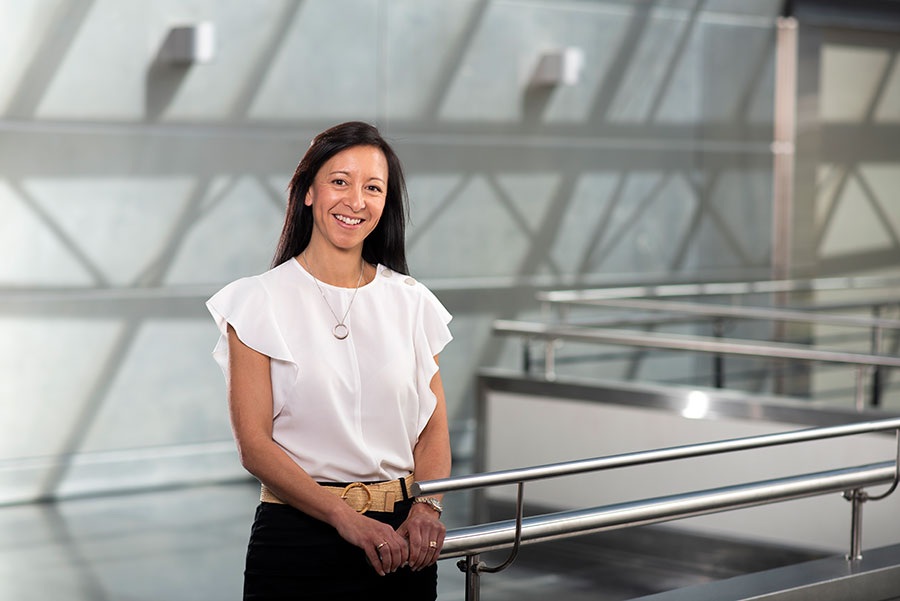Researcher Highlights
The clever new science creating widespread community health benefits
By researching chronic disease and implementation science in tandem, Dr Rachel Sutherland is working to ensure the latest health research can benefit entire communities, leading to programs that can be effectively scaled up to reach more people across Australia and the globe.

Dr Rachel Sutherland is taking a fresh perspective to solving some of the world’s most enduring health challenges, including obesity and sedentary lifestyles. Her research aims to better understand chronic disease and create evidence-based solutions. But it doesn’t stop there. Rachel is also committed to researching the best ways of implementing those solutions into routine care and practice—allowing the latest research to have a direct impact in people’s lives and create community-wide change.
“My health research focuses on preventing chronic disease, with a particular focus on preventing excessive weight gain and obesity via implementing nutrition and physical activity interventions targeting schools (primary and secondary) and parents.
“I am very passionate about ensuring programs are delivered at scale, reach the communities that they would benefit most, and that research is translated and doesn’t just sit idle on the shelf.
“To do this, my research primarily evaluates methods of implementing evidence-based programs at scale—known as implementation science. Essentially, this type of research is conducted to ensure the community benefits from research that has been shown to be effective.”
When the rubber hits the road
Every year, talented researchers undertake extraordinarily valuable research with the potential to save and improve lives. The problem, Rachel says, is that much of this research is never delivered in practice, even when it’s proven to be effective.
“Unfortunately, research shows that it generally takes 17 years for research to benefit the community. Research that can’t be implemented successfully rarely helps the community. Implementation science aims to bridge this evidence-to-practice gap.”
To mobilise more research in Australia, Rachel and her peers are committed to investigating what stops research from translating into practice and, based on this knowledge, design evidence-based strategies for implementing research more effectively.
“As an implementation researcher, you need to be able to listen, communicate and understand a setting and the barriers to implementation. Unless you understand a setting and work in partnership, implementation at scale is not possible and not sustainable. It is essential to have commitment from partners and a clear vision from the outset of how the research can be translated.”
Rachel’s work in the pioneering field of implementation science neatly complements her health research, creating a powerful combination that enables the most exciting research findings to translate into innovative programs, policies and initiatives with widespread community health benefits.
“The field of implementation science and the science of scaling up is relatively new. This means new methods and measures are emerging and need to be developed. I’m excited to use implementation science to scale up nutrition and physical activity interventions to the community.
“My overarching aim is to prevent problematic weight gain and obesity before chronic disease is established and to maintain the health and wellbeing of children and families.”
Setting children on the right path
Rachel’s PhD research, completed in 2017, focused on the public health epidemic of obesity, a disease that can contribute to other chronic illnesses, like type 2 diabetes and some cancers. Her work created waves in the health research community; it was the first trial internationally to demonstrate an increase in physical activity and a reduction in unhealthy weight gain using cost-effective methods targeting disadvantaged adolescents.
Her PhD work was identified in the NSW Premier’s implementation plan for the prevention of obesity in children and informed Physical Activity 4 Everyone, a new school program that is now being implemented in schools across four local health districts in NSW, helping secondary schools teach healthy habits that can continue throughout a child’s life.
“As a result of the program, up to 25,000 adolescents are now attending NSW secondary schools that support physical activity and help adolescents maintain their physical activity levels in critical years when activity levels generally decline. This has a range of health, wellbeing and educational benefits.”
Rachel is currently involved in the scalable nutrition program SWAP IT, which helps parents pack healthy school lunchboxes for their children. Parents are encouraged and supported to swap out nutrient-poor foods for healthier alternatives.
“The food children consume at school impacts on their concentration, health and wellbeing—now and into the future. More than 85 per cent of school children take a packed lunch to school every day; however, packed inside are more than three servings of energy-dense, nutrition-poor snack foods.
“Making one to two simple swaps every day in the lunchbox can have an enormous impact at a population level, both in terms of health, education and wellbeing.”
Rachel’s program of work is being conducted in collaboration with industry partner, Skoolbag. It has received backing from the NSW Ministry of Health to evaluate the program’s health benefits, as well as funding from the NIB Foundation to scale up the program across the Hunter New England region.
Rachel’s work often takes place in partnership with multiple key stakeholders, who all play an integral role in seeing inventions implemented successfully.
“For implementation and scale-up to be successful, research and interventions need to be co-developed with partners across a range of settings where health may not be their core business. This takes time, communication and a great deal of understanding of how settings and organisations work.
“It’s exciting to work in partnership with stakeholders across a range of settings and see the community benefit from our research. Having the research delivered at scale to the community, and translated into tangible solutions, is the most important aspect of my work.”
The University of Newcastle acknowledges the traditional custodians of the lands within our footprint areas: Awabakal, Darkinjung, Biripai, Worimi, Wonnarua, and Eora Nations. We also pay respect to the wisdom of our Elders past and present.
